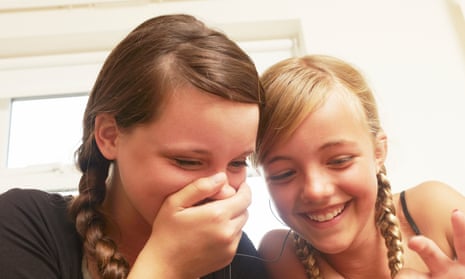I write comedy teen fiction.
And I feel like I need to start with that statement, because apparently authors like me don’t exist.
A recent national newspaper feature bemoaned – with surprising ferocity and not a little generalisation – the “darkness” of current teen fiction: complained about the absence of anything joyful or humorous currently being offered to children. It was an article that, frankly, left quite a few authors looking curiously down at our own laps and wondering if we’d become invisible overnight, or had perhaps spontaneously evaporated out of the literary canon along with our vast book sales.
Because while it’s true that the media may like to sensationalise and focus on the darker books at times (as do, let’s be honest, a few of the awards panels), children don’t. Children go – as children always have – where they like. They read what they like, they explore any world that appeals to them at that moment. And they love - with intensity, with loyalty, with passion - a million different types of book, infinite types of narrative, of life, of story, all at once. That fluidity - an imagination and ability to adapt and adjust - is what makes them children. It’s what makes us love writing for them, above and beyond anyone else.
So-called “dark” books - those that touch on “dangerous”, “sensitive” or “subversive” subjects - are, no matter what anyone says, important. They allow children and teens to delicately explore topics that fascinate them in their own space and at their own pace: to empathise with people who live other lives, or to find themselves reflected if they are suffering privately. Life is not always easy. It’s not always simple, or straight-forward, and a lot of excellent books reflect that struggle perfectly. They allow us to cry, to hurt, to feel and discover, in safety and peace, and they do so beautifully, and poignantly: with grace and art.
But just as the dark is essential for children, so - too - is the light.
As a writer of nearly 30 years (my first story was a rhyming poem about a unicorn, aged five: inexplicably, it has yet to obtain a film deal), I was desperate to be taken seriously. I wanted to be heard: for my intelligence to be acknowledged, for my name to be spoken in hushed, revered tones (preferably whilst being bowed to).

Particularly as a woman, I wanted to be respected. So my first attempt at a book was a very long novel about teenage depression and suicide, in which whole pages were dedicated to descriptions of water droplets. I worked at it for nearly three years, until every one of its 120,000 words had been selected, mulled over and replaced to within an inch of its life.
And it wasn’t until I got to the end that I realised that - in the process of my Quest for Literary Glory - I had killed it. In my egotistical desire to be a Great Writer, I had put myself and my pride first and the story second. Not because darkness can’t be written beautifully - it can and frequently is - but because it just wasn’t me. I had crushed the narrative to fit into who I wanted to be - into a self-important role I wanted to fill - and as a consequence my book was… lifeless. Stale and joyless. And I couldn’t sell it for toffee.
So I tried again. Except this time I stopped trying to be anything: I focused on putting the story first. For the first time in a life spent writing, I let humour, joy and laughter in where they needed to be: I let the story tell me how to tell it. And this time, pathos entered in its own pace. As did pain and hurt; heartbreak and loss, bullying and anxiety. But they came naturally, with happiness, with lightness, with joy, with the qualities that finally breathed life into my characters, and into my books.
And then - irony of ironies - I won awards and sold the proverbial shedload: probably because I was no longer actually trying to and people can always tell.
Life is darkness and light, and we are all a combination. And - in the same way - so every story comes with its own way of telling it: its own way of existing, of living, of breathing. Sometimes that way is sombre, and thoughtful, and touching, and sometimes it is lighter and sunnier, with laughter and wit. Frequently - much like life - it comes with both.
But I can say with some assurance that we are all very much here. Authors, telling our different stories, in both lightness and darkness. Putting the books first, instead of ourselves. And writing for children, who deserve it all: the humour and the sadness, the pain and the joy. Who are capable of reading and loving every shade of it.
And who have - and should always have - the freedom to choose what they want to read.
All Holly Smale’s fabulous Geek Girl series are available to buy from the Guardian bookshop: Geek Girl, Model Misfit, Picture Perfect, All That Glitters and her latest (and fifth in the series): Head Over Heels. There is also a Christmas special All Wrapped Up and summer special due out this summer: Sunny Side Up.
You can see Holly Smale live at the Hay festival this year, interviewed by the Guardian children’s books site’s very own Emily Drabble at 5:30pm on Saturday 28 May at The Starlight Stage, Hay festival. Book tickets here.

